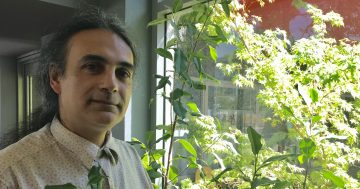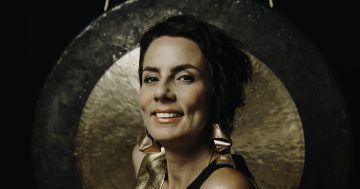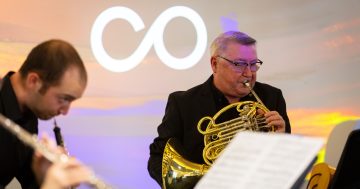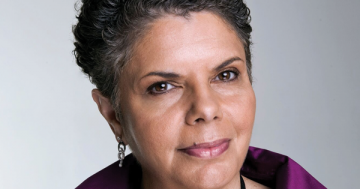
Head of the ANU School of Music, Associate Professor Kim Cunio. Photo: ANU.
The Canberra Symphony Orchestra will debut a thought-provoking new work by ANU School of Music head Kim Cunio about climate change at its coming Saturday Matinee concert at Llewellyn Hall on 19 June.
Entitled The Elements, the concert will also include the soaring and transcendent Lark Ascending by Vaughan Williams, a seascape from one of his students, Grace Williams, and Haydn’s Fire Symphony (No 59).
Concertmaster and violinist Kirsten Williams will lead the orchestra except for the Cunio work, which the composer will conduct.
Cunio’s CO2 and the Ice Core is a combination of orchestral music and pre-recorded sounds from an Indian coal processing plant and melting ice cores collected by the British Antarctic Survey.
He says the work was born out of the Adani coal mine controversy and his thoughts about the impacts of fossil fuel use on global warming.
Cunio was able to collect the recordings while touring India in 2018, and he knew he could bring them together in a composition, an idea that crystalised when the CSO asked him last year to compose a work for it.
When he heard about the coal plant he wanted to hear the sound of what happens to coal, discovering the industry’s seedy underbelly as well.
“I went there and found out it was diabolical – a lot of the pit crew who work in the mining industry in India are the poorest of the poor and paid a $1 a day,” he said.
By chance he ended up at the British Antarctic Survey on another project and was given a recording of an ice core melting to listen to.
It was the sound of CO2 and methane leaving the ice as they measured it for climate change research.
“It was the most beautiful sound. I cried when I heard it, it was so incredible,” he said.
Cunio was able to hold an ice core hundreds of thousands of years old in his hands, an equally emotional experience.
He was able to transcribe what he heard and put it into a scale, and much what the orchestra plays is actually derived from this.
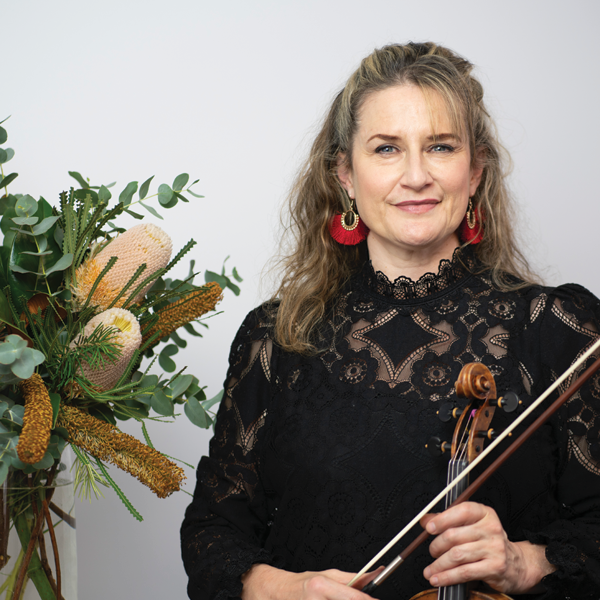
Violinist Kirsten Williams: the voice of humanity in Cunio’s new work. Photo: CSO.
The pre-recorded sounds are like interludes between the work’s three movements and the orchestra will also have to improvise under Cunio’s guidance.
“It’s eerie. They’re like little sputterings of sound that come and go and disappear,” he said.
“It’s a piece on a level that doesn’t have quite the same degree of melody you’d normally hear but it’s quite a captivating world you enter into.”
Wary of that world being too constricting, Cunio has provided a very slow, beautiful violin piece for Williams as the voice of humanity.
And lest the work be too sombre, the second movement moves from a Middle Eastern sound to a wild jazz groove as Cunio imagines the last party of the fossil fuel industry.
“What’s it like if you’re a fossil fuel executive and you’ve got to move into renewables,” he said.
Cunio is not sure just what the final result will be but he loves the fact that Canberra has an orchestra that wants to play new music and is willing to tackle big issues such as climate change.
Williams describes the matinee offering as the orchestra inviting the audience into its living room to afternoon tea for a relaxed and intimate experience.
The Lark Ascending is a special piece for her, having played it for her late father who had dementia.
The orchestral colours were so evocative and it took you to another realm with such peacefulness and serenity, she said.
The composer’s student, Grace Williams, was one of the 20th century’s finest female composers and her Sea Sketches was a “wonderful piece with five different movements depicting the ever-changing moods of the sea off the Welsh coast”.
SATURDAY SERIES | Classic Afternoon: The Elements
2:00 pm, Saturday 19 June, Llewellyn Hall
Grace WILLIAMS, Sea Sketches
Ralph VAUGHAN WILLIAMS, The Lark Ascending
Kim CUNIO, CO2 and the Ice Core, world premiere
Joseph HAYDN Symphony No. 59 in A major, ‘Fire’.
Bookings at the CSO website.












